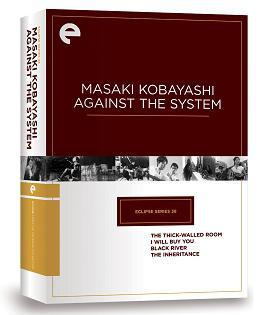Master Japanese director Masaki Kobayashi was as much a social and political critic as he was a celebrated filmmaker. He used every opportunity in his work to make comments on the necessity of political and social reform in Japan, sometimes to the detriment of his career and the fortunes of his studio (who, for example, waited three years to release the scathing indictment offered in the first film in this set). Removed from their political venting, however, the films in Masaki Kobayashi Against the System remain imminently watchable and relatable, proof positive that a master was at work.

Studio: Criterion
Distributed By: N/A
Video Resolution and Encode: 480I/MPEG-2
Aspect Ratio: 2.40:1, 1.33:1
Audio: Other
Subtitles: English
Rating: Not Rated
Run Time: 7 Hr. 20 Min.
Package Includes: DVD
four slimline cases in a slipcoverDisc Type: DVD-5 (single layer)
Region: 1
Release Date: 04/16/2013
MSRP: $59.95
The Production Rating: 3.5/5
Video Rating: 3.5/5 3D Rating: NA
Audio Rating: 3.5/5
Special Features Rating: 1/5
Overall Rating: 3.5/5
Reviewed By: Matt Hough
Support HTF when you buy this title:
